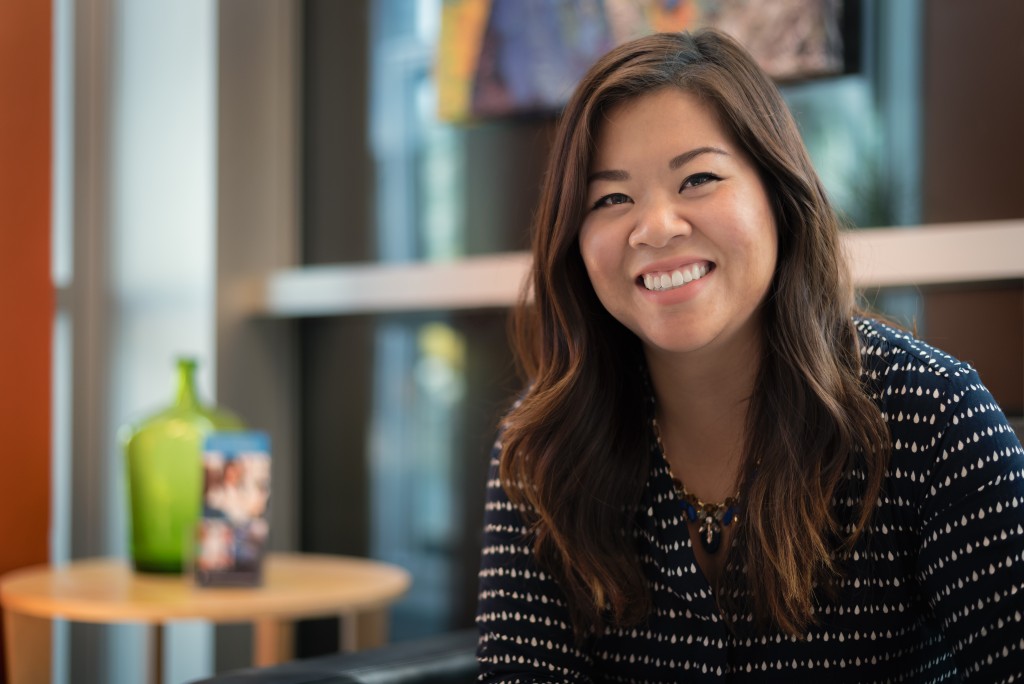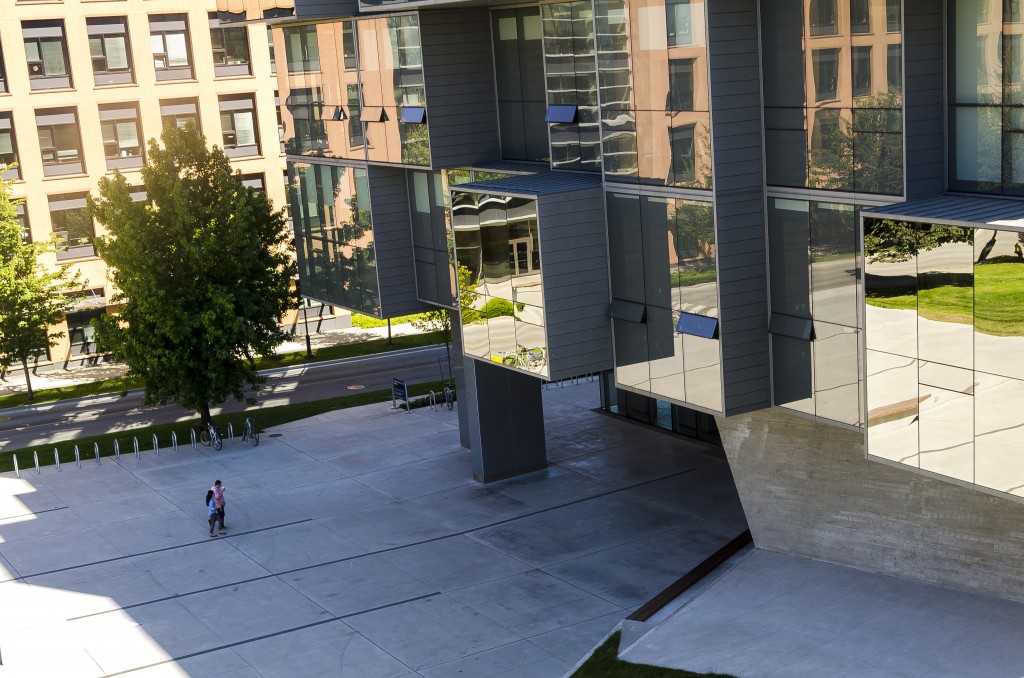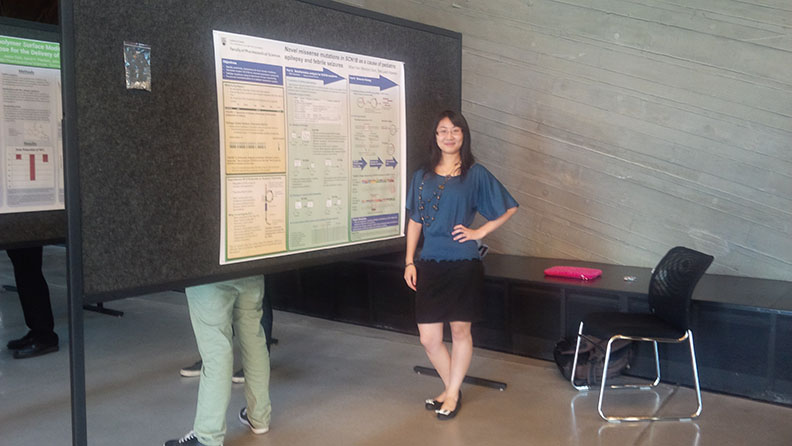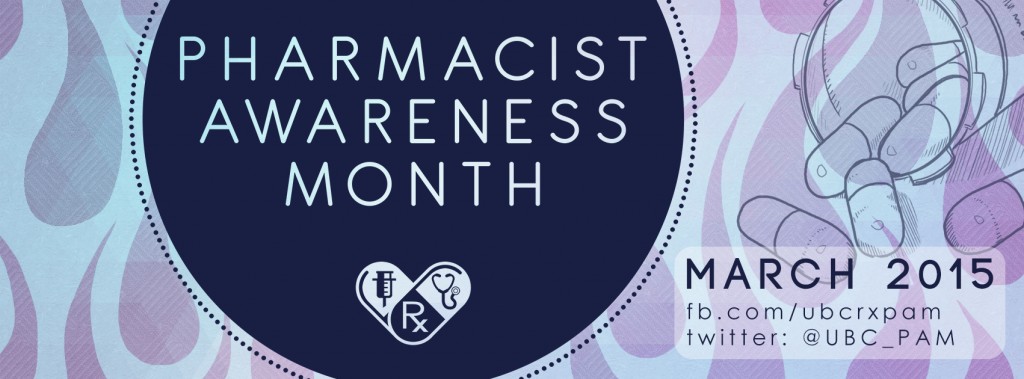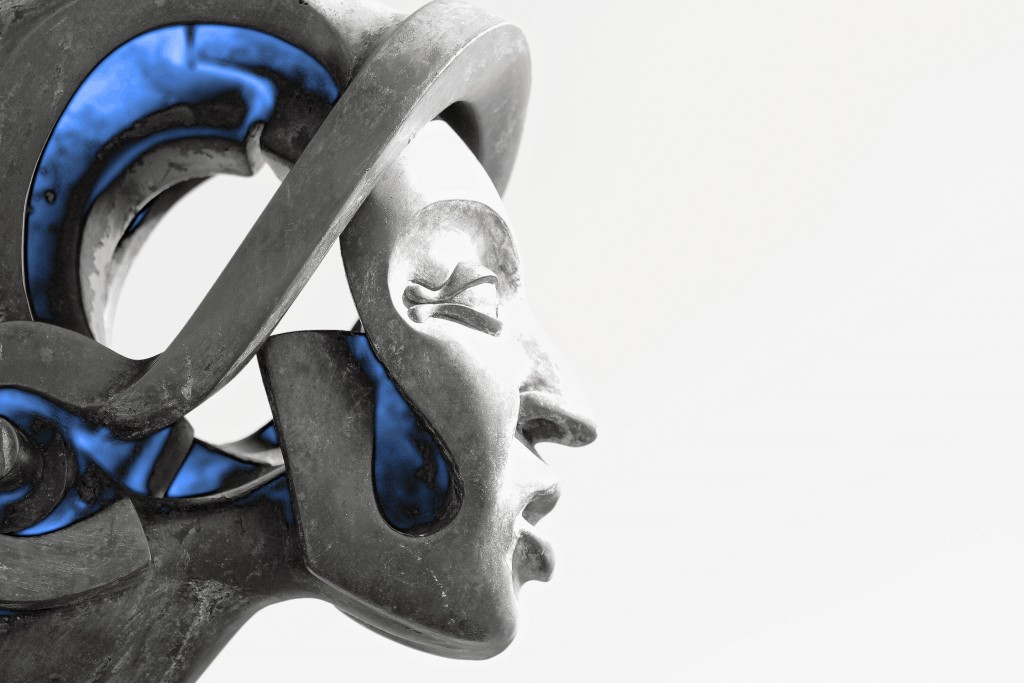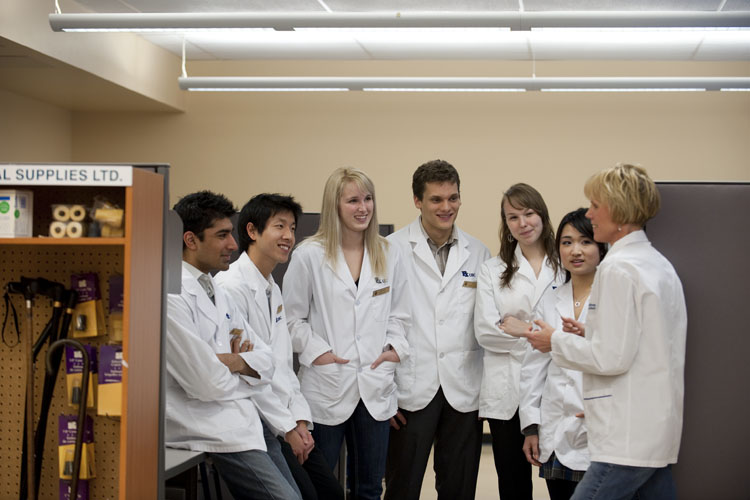Pathways in Pharmacy is a new monthly series where we’ll learn about different career journeys that began with a pharmacy degree. This month, Mark Kunzli tells us about his journey to, through, from, and ultimately back to UBC Pharm Sci.
Mark (top left) with his family, June 2015. His late father Ken, brothers Matthew and Michael, sisters Kristi and Karli, and his nieces Hazel, Mia, and Rihlynn.
JK: Why did you decide to study pharmacy?
MK: While I’d like to say that it’s because I’ve had a passion for counting by fives and getting yelled at for prescriptions not being covered since I was a child, my path to (and then through) pharmacy was not linear.
After high school, I knew I wanted to pursue post-secondary education but had no idea what to study. I started out taking first-year Arts courses, and, after actually getting 0% on a paper in Sociology, decided that I was better suited to the more black and white world of science. So the following year, I took all first-year Sciences courses – but unfortunately brought my last-minute cramming/writing work ethic with me and my average took a hit.
I went into second-year science without any real direction, and a week into school I ran into a friend from the previous year who wasn’t in any of my classes. I asked what he was studying and he said he was re-taking all his first-year science courses to bring up his average to apply for the BSc(Pharm) program. That was the first time I’d thought of studying pharmacy. My best friend Luke LePage’s dad was a pharmacist, so I had a chat with him to find out more about what I could expect. I was initially attracted by the prospect of a stable job with a good income but the more I learned about pharmacy the more the profession appealed to me. Cliché I know, but I’ve always enjoyed helping people and am a social person, so the opportunity to interact with and build relationships with patients interested me.
Deciding that the third time would be the charm, I re-took all my first-year science courses in order to increase my average and apply for the BSc(Pharm) program. It worked!
JK: Tell us about your first foray into working as a pharmacist.
MK: After graduation I moved to the thriving metropolis of Campbell River, where I worked at Willow Point Peoples Drug Mart for Victor Choo. It was the middle of golf season, and Victor was an avid golfer. After showing me the ropes for a few weeks, he hit the links and I was left to find out what I was made of as a pharmacist. Outside of my clerkships, I hadn’t worked in a pharmacy before and freely admit that I was terrified and completely overwhelmed for those first couple of months. But when faced with the choice to sink or swim, I quickly decided that I’d leave the sinking (of putts) to Victor, and I learned to swim.
There were a few early lessons – like the time I made my first typo on a prescription, didn’t know how to correct it, and thought I’d forever be branded as illiterate by anyone looking at the patient’s PharmaNet profile. I also recall learning the very valuable lesson that some people have surnames that can also be used as first names and that doctors will occasionally write a patient’s last name first without punctuation in-between (are commas that hard to write?!). Thankfully the medical office assistant that received my frantic phone call was gentle when she told me that I was an idiot and I needed to switch the names around.
After a couple of months of almost daily phone calls to other pharmacists for help and getting to know everybody at tech support on a first-name basis, I’d found my way and was promoted to Pharmacy Manager.
JK: What are some key takeaways from this role?
MK: I worked at Willow Point Peoples Drug Mart for almost two years and consider myself incredibly fortunate to have had that opportunity. I’ve always liked the adage “why work hard when you can work smart?” and took a keen interest in streamlining pharmacy operations. I learned the pharmacy dispensing software inside-and-out, mainly through trial and error, but always made sure I understood why things worked the way they did. This gave me much greater insight into how to automate processes, and more importantly allowed me to investigate and help patients when they asked why certain things were covered when others weren’t.
I learned about the impact that drug coverage (or the lack thereof) has on compliance. I focused on finding win-win’s for the patient and the pharmacy, and found that minimizing out-of-cost expense for patients not only increased compliance, but increased loyalty beyond a transactional relationship. In doing so, I was able to earn the respect of both my patients and my physician colleagues while also seeing the business side of the pharmacy do quite well.
While those first few months saw many words (unsuitable for this blog) muttered under my breath, I had an awesome group of co-workers to support me and benefited tremendously from the autonomy I was given by Victor. With the benefit of experience, I realize now that the only words I should have been muttering were ‘thank you.’ I believe that a good working environment is half who you work with, and half what you make of it. I’ve always been very fortunate to work with great people.
JK: You have an Executive MBA in Healthcare Management. Why did you pursue this program and how has it complemented your pharmacy degree?
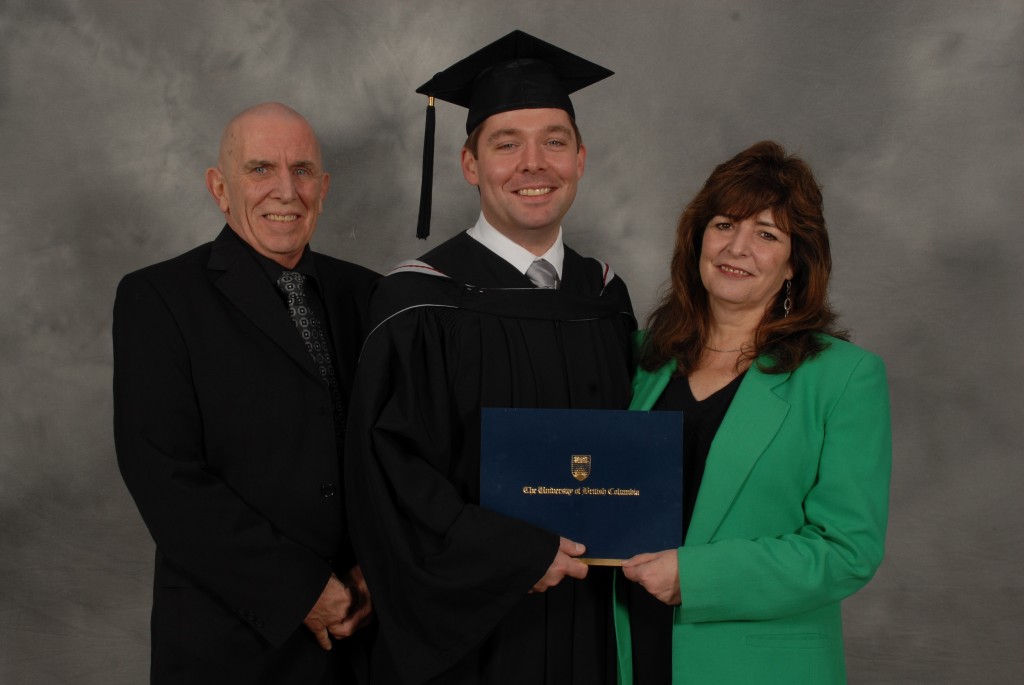
Executive MBA graduation, November 2011. Mark with his parents Ken and Kathy.
MK: Well, as I mentioned, after starting out as a pharmacist I found myself drawn to the operational and financial aspects of the profession. I left my first job in Campbell River to work as a relief pharmacist; starting a company and contracting myself as a locum around the province. I wanted the freedom to pick and choose when and where I worked, as well as the opportunity to learn how different pharmacies are run.
In late 2009 I ran into my former prof, Dr. Wayne Riggs, at an alumni event and inquired about opportunities to get involved with the Faculty again. He suggested I sit down with Dr. Ron Reid to discuss his efforts in bringing pharmacogenomics into pharmacy practice. I met Ron at Timmies and quickly saw the potential of this idea. While my front-line experience working as a pharmacist was enough to understand how genomics could be implemented in the pharmacy environment, I wanted to expand my knowledge to figure out how we could make it happen.
My dad had always suggested I consider studying for an MBA to complement my pharmacy degree. I ran the idea of the Executive MBA in Healthcare Management program by Ron and Wayne, who both encouraged me to go for it. What appealed to me about the program was the fact that it would allow me to continue to work as a pharmacist while studying, and also that I would be studying alongside, and learning from, people from other healthcare disciplines. As I went through the program I found that my view of the world expanded from very pharmacy-centric; to gaining an appreciation of where pharmacy fits into the healthcare system; to understanding how healthcare fits into the economy and society as a whole.
I was able to choose my own topics for MBA assignments. I focused on pharmacogenomics for most of my assignments, working very closely with Ron and Wayne on different aspects of how to bring pharmacogenomics into pharmacy practice. This work helped develop the foundation for my current role, where I work with Drs. Corey Nislow and Ron Reid on projects implementing pharmacist-led pharmacogenomics.
JK: What made you decide to take a different path from community pharmacy practice?
MK: I’m still a community pharmacist at heart! While I’m full-time in my position here at the Faculty, I do take shifts to keep myself up-to-date and able to appreciate what my colleagues are experiencing in the field. In terms of what led me here, it was a series of decisions to pursue what interested me most in pharmacy practice. Don’t get me wrong, I often miss interacting and building relationships with patients, but I’m competitive by nature and thrive on a challenge. In practice, this led to finding ways to optimize processes and seek out ways to continuously improve. This took me from the dispensary in Campbell River, to pharmacies throughout the province, and then into that conversation at Timmies with Ron. It was during that discussion (over our delicious and very reasonably-priced coffee) that I realized that my profession has a unique opportunity to make people healthier through pharmacogenomics. I wanted to contribute in any way I could. My need for a new challenge and continuing desire to give back to the profession led me to take a different path from community pharmacy practice but I wouldn’t be where I am today without Ron’s influence, Dr. Corey Nislow giving me an opportunity to actually do this, and the support of them and many others along the way.
JK: If you could go back and give some strongly worded advice to your pharmacy-school self, what would you tell him?
MK: Geez, my pharmacy-school self probably wouldn’t believe that my present-day self is even real!
Off the top, there’s my go-to piece of advice from Michael Scott, “Don’t be an idiot” (https://youtu.be/aVlG9W1eUio). There are numerous times when I would have benefited from hearing that in pharmacy school.
I think more than anything I’d encourage pharmacy student-me to always learn from failure. My road through school and life definitely could have been easier if I’d learned some lessons sooner, but my failures taught me important lessons and also made me appreciate my successes that much more. Case in point, I failed Ron’s class in pharmacy school (along with 15 of my classmates that year, for the record), and ended up leaving my summer job two weeks early to come to Vancouver and study to make sure I passed the supplemental. Ron walked by me one day in IRC and said “about time you did some studying.” He was right. And now, the topic of that same course that I didn’t understand the value of as a student – pharmacogenomics – is a huge part of my career and hopefully one day soon, my profession. And that same prof is one of my closest friends and most valued colleagues.
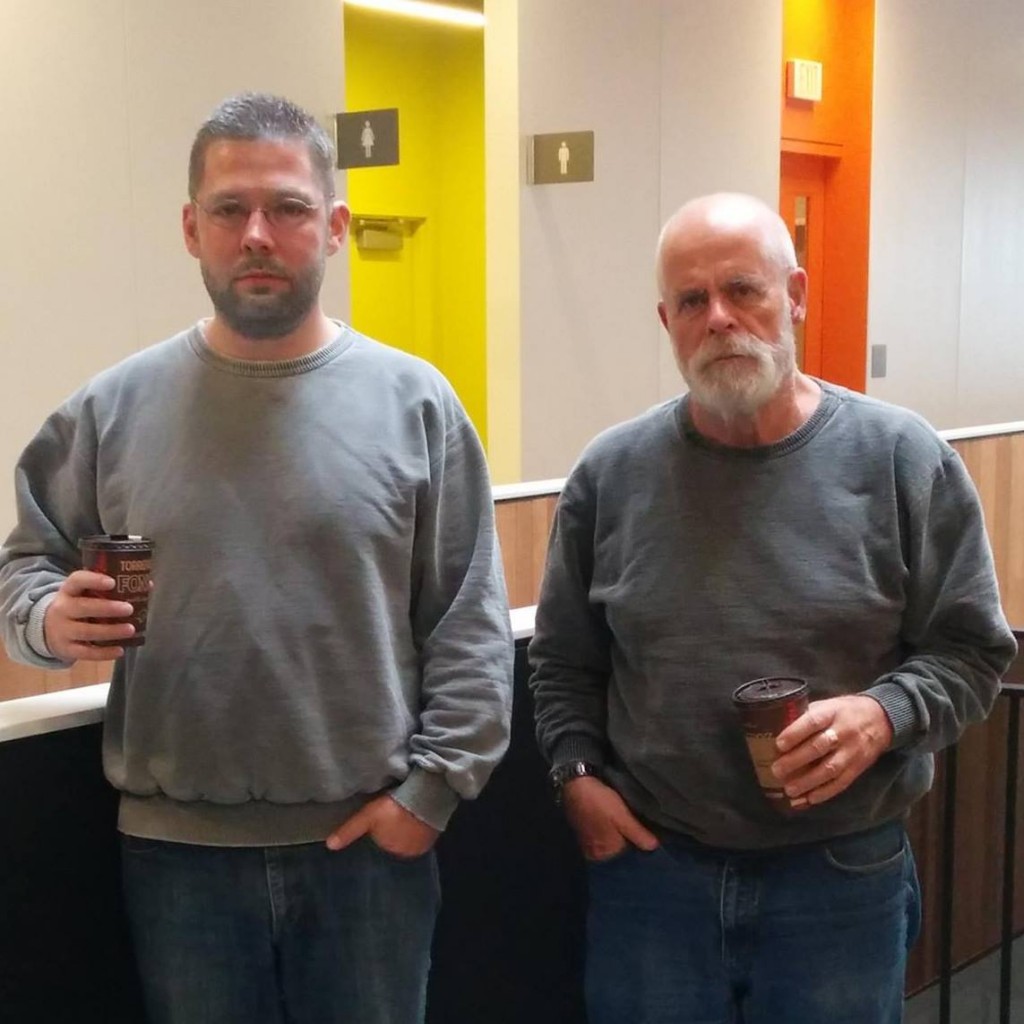
Mark and Ron, Halloween 2014. You know you’ve been working with someone for too long when…
At the end of the day – do your best, but even when you fail you can learn a hell of a lot from it. Provided you’re not an idiot, of course!
Any questions for Mark? Leave them in the comments or on Facebook.
Mark Kunzli is Project Manager & Associate Director, UBC Sequencing Centre.
Learn more about our programs here.

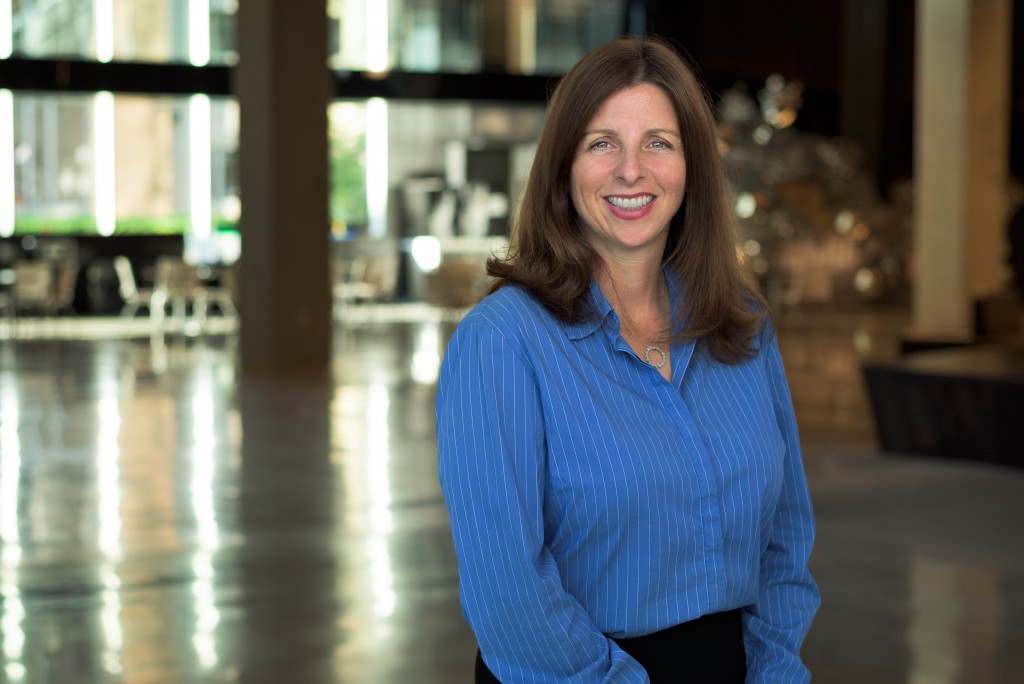
 Follow
Follow


